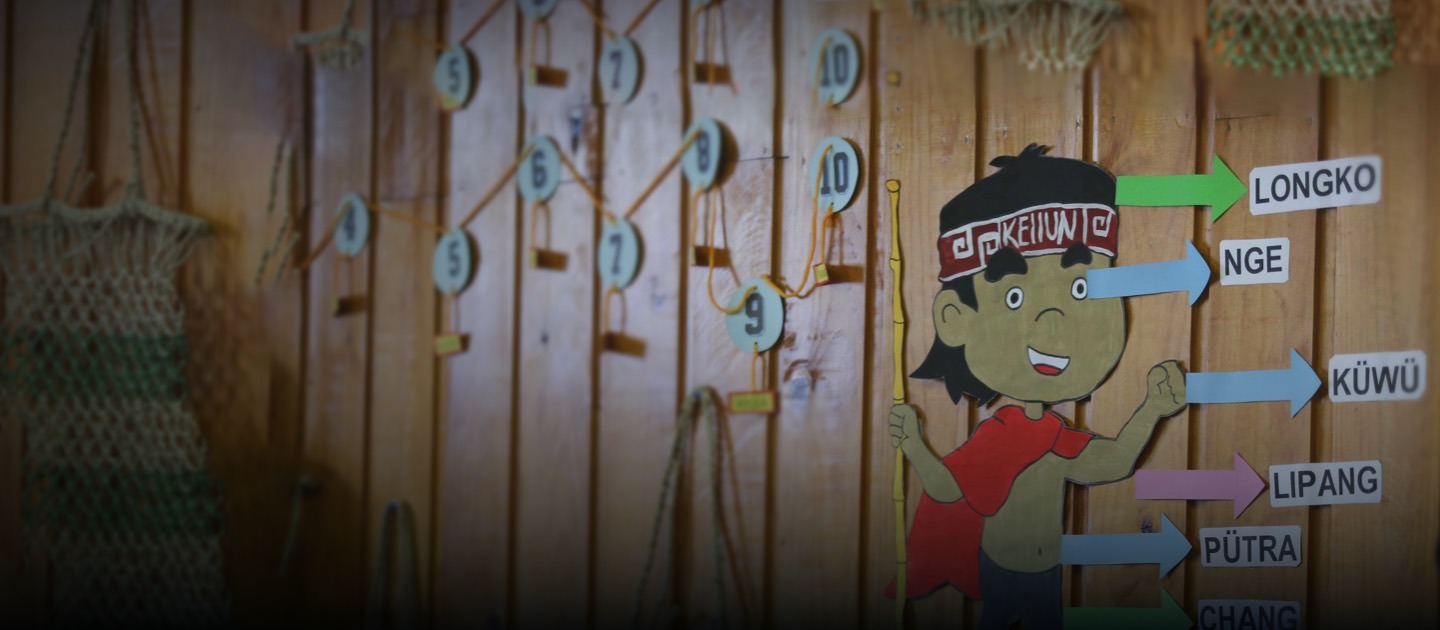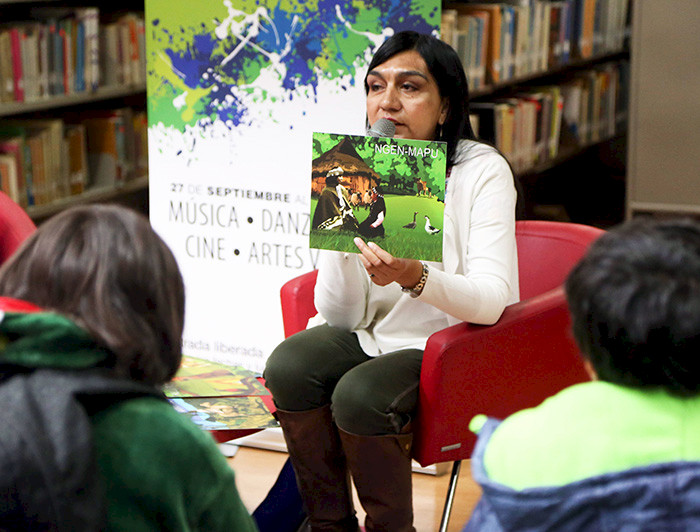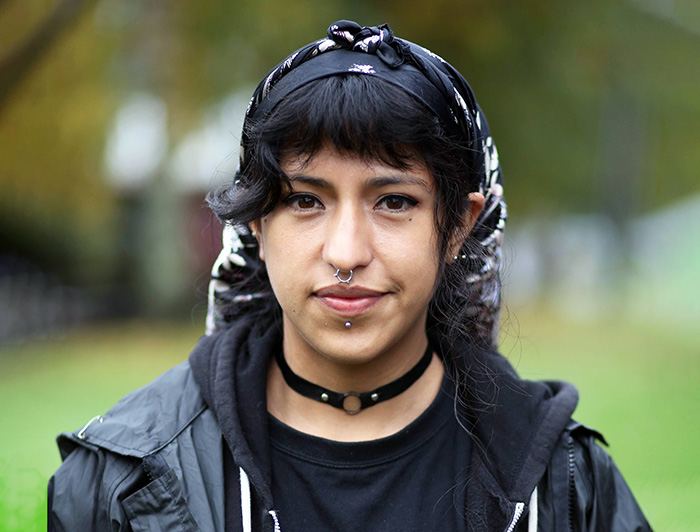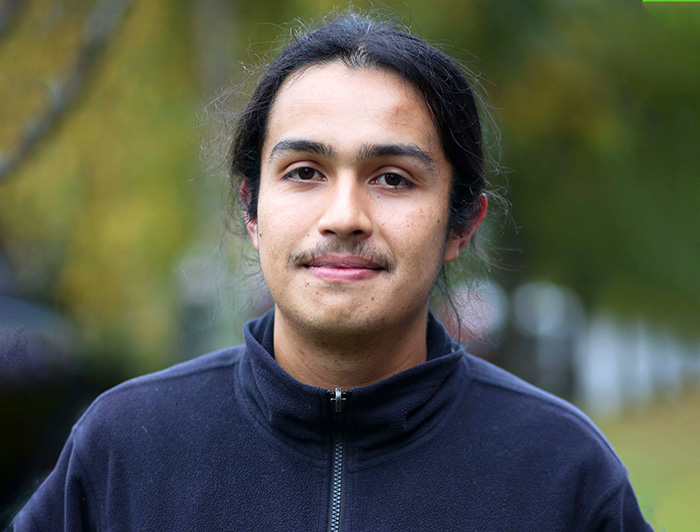
The ancient language of Mapudungun is very alive today
A group of faculty members from the Villarrica Campus is actively working towards revitalizing the Mapuche language through the celebration of the "Mapudungun Week" and the creation of a Mapudungun-exclusive classroom.

photo_camera One of the driving forces behind the project at the Villarrica Campus is Professor María Isabel Lara Millapán. The group has joined forces in an attempt to keep their language alive. (Photo by: Campus Villarrica)
Mapudungun is the native language of the Mapuche people.
The number of active Mapudungun speakers is estimated to fluctuate between 100,000 and 200,000 people, according to a study published by the Center for Public Studies (CEP) in 2016.
These figures are of great concern for the Mapuche community and academia, because according to the 2017 Population and Housing Census, more than one million seven hundred thousand people (1,745,147 to be exact) identified as Mapuche people.
Seeking to help revitalize this language, three professors of Mapuche origin from the Villarrica campus have partnered to form the Mapuche kimelfe mapudungun mew group (Mapuche Professors for Mapudungun).
According to María Isabel Lara Millapán, one of the professors, the group wants to make a contribution, and what better way to do it than through Mapudungun, which is key to cultural identity.
"We all have a background in language, and today we want to work together on a project that addresses the territory from a horizontal perspective."
She is part of the Villarrica campus faculty and holds a PhD in Language and Literature Didactics from Universidad Autónoma de Barcelona.
According to the professor, they have four lines of work:
- Teaching, which they have already developed through courses;
- Research, which focuses on participatory research, and in the future seeks to record and analyze native speakers;
- Outreach activities, such as the Mapudungun Week;
- Language didactics, which has to do with the theoretical and practical bases for language teaching.
"We want Mapudungun to be used everywhere. Right now, it is only partially taught. Mapudungun needs to become an instructional language in all school subjects. It should be used for communication, creation, speaking, reading and writing."
According to Viktor Naqill, a researcher of the Center for Intercultural and Indigenous Research (CIIR) and one of the professors involved in the project:
"In the long term, we would like to create a center focused on the teaching of Mapudungun. However, before this, we must reach a consensus at the territorial level on what we understand by revitalization and the strategies that guarantee this objective."
In addition to Lara and Naquill, Mariela Carimán is also part of the group.
The project is supported by the director of the Villarrica Campus, Gonzalo Valdivieso, and Mapuche organizations in the area.
The Mapudungun Week
As part of this project, the Mapudungun ñi reglentu (Mapudungun Week) was celebrated at the Villarrica Campus.
The objective of this initiative is to contribute to the revitalization of the language through its teaching, dissemination and study.
This is because the initiative is based on a territorial approach, i.e., the revitalization of the Mapuche language is only viable if its teaching and use is guaranteed in its own territory.
For this to happen, lof (family clans) and organizations need to actively participate in the construction and promotion of the Mapudungun revitalization strategy.
The week organized by the Villarrica campus sought to achieve this.
"We truly believe that recognition arises from the genuine motivation to know and discover the richness of the culture, history and language of the people," explained Gonzalo Valdivieso, director of the UC Villarrica Campus, about this unprecedented event, which was open to the entire community.
"A space was created to showcase Mapudungun as a living language and to talk about it. The activities combined these two purposes," added Viktor Naqill.
Busting the myth around Mapudungun

A key part of the Mapudungun Week was a discussion on the experience of teaching and learning Mapudungun.
Paulina Melinka Poffald Quelempan (28) participated in this event and shared her experience learning Mapudungun as a second language. Her testimony served to break the myth that Mapudungun can only be learned as a first language or as a native speaker.
Paulina now teaches Mapudungun at Mapuzuguletuaiñ, an organization founded in Temuco that focuses on teaching the language.
"About four years ago, I started studying Mapudungun. I am Mapuche, so I have always wanted to recover some traditions that were practiced by my community or family when I was a child, which slowly disappeared. When I started attending university, I met groups that were putting the Mapudungun issue on the table. I had looked for courses before, but I didn't feel like I was really learning, or I felt it was too difficult, and I wasn't getting good results. Today I am focused on studying Mapuzungun and teaching it."
"The most difficult part of learning is being persistent, because sometimes you want to give up. As Mapudungun is barely present in everyday life, there is little access to kimeltu (professors), as they are in short supply. Setting up self-managed activities requires a lot of work and energy, which is not always available. That is why persistence is key."
At first, she started teaching in order to continue speaking and learning Mapudungun. This forced her to maintain a level at which she could answer the questions of her chillkatufe (students).
"That was my initial motivation, but as I continued, I became aware of how important it is not to lose the language. By teaching, you are contributing to that, so that people like myself have the possibility to move forward and recover their language, to bring it back to their families and to make the older people remember things or stop feeling ashamed and feel proud again."

Didier Antilef Lara (25), a graduate of the Mapudungun course given by the UC and a student of the Primary Education Program in Temuco, also participated in the discussion.
He already spoke Mapudungun, but he took the course to improve his skills. For the past four years, he has also been giving classes to his friends and to those who request them. Prioritizing Mapuche people, as he considers them to have more of a duty in learning the language.
"I am very excited to see young people wanting to learn Mapudungun. We are many Mapuches, and it is very important to recognize where you come from and to know who your family is. Seeing people of the same age, or even younger than you, who are in this university studying to become a professor, is something that is empowering. You feel like there is hope yet, that the language will not disappear. Right now, the situation is dire, and its disappearance may be imminent. So, the fact that there are people who are interested in the education of children and who are interested in learning Mapudungun in order to teach it, makes me feel like we are on the right track."
Didier would like the Mapudungun classes to continue, so that more people can join and hopefully reach the final stages of the learning process.
"In the first course, we learned basic notions of the subject. We learned how to introduce ourselves and basic vocabulary about food, seasons and objects. But there is still a lot to learn."
Different Music Styles in Mapudungun

The closing event of the Mapudungun Week was an ayekan (concert) held at the auditorium of the Liquén Cultural Center in Villarrica.
The music and singing event featured artists of various musical genres and styles, but only in Mapudungun.
The spirit of the ayekan was to provide a space where only the Mapuche language was used, and to assert Mapudungun as a living language that allows creation.
"The objective was to show how Mapudungun is present in different areas: in communication, art, written texts, in all spaces where we can communicate. The ayekan featured traditional music as well as more contemporary singing. There was a punk band and a soloist who sings ballads," said María Lara.
All in Mapudungun.


